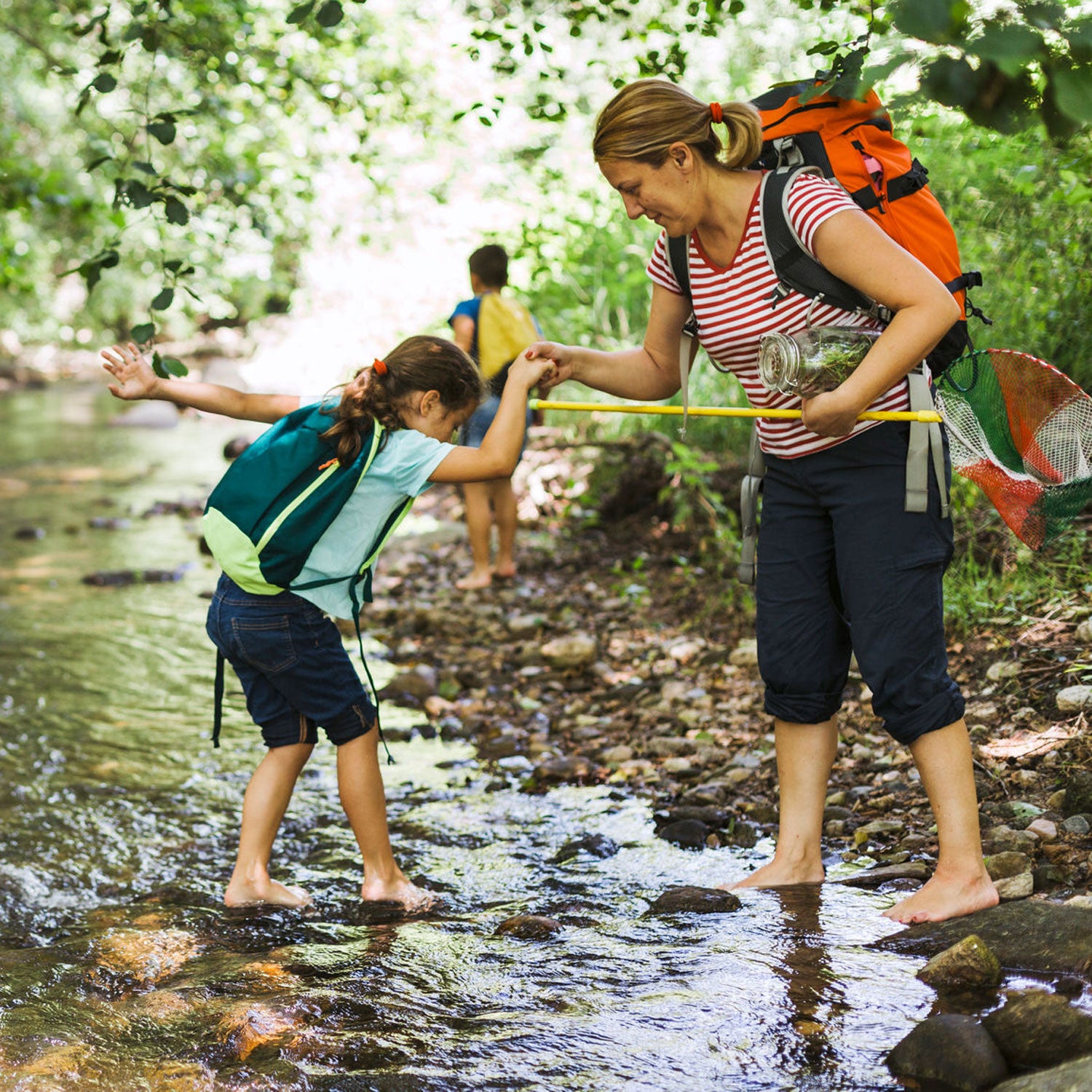Back in the long, lazy days before babies, Steve and I vowed to raise our children outside on fresh air and nature and as many backcountry trips as we could muster. At the time, this seemed completely reasonable. We did not know it would kick our asses again and again. Just trying to get out the door with all the gear and our sanity intact was a herculean effort, not to mention middle-of-the-night diaper changes on the tent floor, river trips where I lay in my sleeping bag wondering if the 500-foot canyon walls above us would topple onto our heads, or ski tours into the backcountry with both kids in tow and a portable crib.
In the ten years since I became a mother, my duties have changed. Days that used to be devoted to breastfeeding and diapers now consist almost entirely of telling people—small people with limited attention spans—to do things. Usually more than once. Second only to that is the corralling of stuff and schedules and more socks than I care to count. No question, the physical toil of parenting has gotten easier as our daughters have grown, but our daily lives are more complex, and the mental and emotional output can be exhausting.
Sociologists call the management of household routines, activities, and tasks “emotional labor,” and it frequently falls into mothers’ hands: booking doctor’s appointments and summer camps; organizing after-school activities; fishing unwashed lacrosse uniforms out of the laundry hamper (oops); keeping tabs on permission slips; planning playdates, birthdays, and teacher gifts. Some of this, of course, is the stuff of privilege, but much is essential: buying new shoes, volunteering at public school, helping neighbors in need—the often unacknowledged details that not only keep a family running but also foster community and social connections.
“By and large, mothers draft the to-do lists while fathers pick and choose among the items.”
Emotional labor is sneaky. It hides in the cracks of our days so that it seems inconsequential, when in fact it’s anything but. We make phone calls on the drive to work, send an email while the kids are brushing their teeth, catch up on texts after they go to bed. Multitasking makes emotional labor look easy, but this is mere illusion. It still creeps into nearly every waking hour and has ripple effects far beyond the home.
“Disregard what your two-career couple friends say about going 50-50,” Judith Shulevitz wrote in . “Sociological studies of heterosexual couples from all strata of society confirm that, by and large, mothers draft the to-do lists while fathers pick and choose among the items. And whether a woman loves or hates worry work, it can scatter her focus on what she does for pay and knock her partway or clean off a career path.”
I’m fully aware that I lucked out with a highly evolved member of the male species. Steve cooks, gardens, and does more than his share of grocery shopping. He loves small furry creatures and babies, and they adore him back. After each of our daughters were born, he toted them around in a fleece sling for nine months because, as he put it, I got to carry them on the inside, so it was his turn to carry them on the outside.
In 18 years together, we’ve gotten our division of labor pretty much dialed. I’m bad at bills; he sucks at technology. He does the garbage; I do laundry. I work from home while he’s out all day running his own company. But still, the details of getting out the door en masse with our shit mostly together ultimately falls to me. In moments of frustration and fatigue, I can become a control freak. “Maybe if you didn’t micromanage so much,” Steve has been known to grumble. I call it managing. Dealing. Mothering.
One of the biggest sources of emotional labor—and tension—in our household is adventure. Like everything, getting out has gotten easier, or at least more routine, but a multiday family mission is still a major commitment. Steve and I have different organizational styles. He tosses his own gear into a duffel ten minutes before we leave (while I glance meaningfully at my watch, trying not to have a heart attack). I organize the girls’ stuff days in advance so I don’t forget extra socks, backup long underwear, and clean clothes for the car trip home. Would Steve remember the down puffies if it were up to him? Doubtful. One time, we drove four blocks from home when we realized we’d forgotten the raft; another time, we left the cooler on the kitchen floor.
Sometimes the sheer volume of crap swirling around in my brain feels like a kind of vertigo, and I think how much easier it would be to stay home and just go the movies instead. There are dogsitters to enlist and Spot beacons to charge and no end to the what-ifs: Have we properly assessed the risk? Will there be rattlesnakes, avalanche danger, exposure to heights? I’m naturally high-strung, while Steve is habitually laid-back, so worry work is mostly my work.
The emotional labor of adventuring is a recipe for stress and resentment in other families, too. “Shawn does almost all of the (always last-minute) packing for our big trips,” says writer Tracy Ross, mother of three and co-conspirator behind her gang’s remote, multiday raft trips and adventures. “This leaves me to do the domestic work, which is make sure the house, the kids, the bills, the schedules, the correspondence, and everything else is taken care of in advance of our departure, while he gets to do the exciting work of making sure we’re set up for the San Juan or the Smith or the Salmon or any other river-ski-bike-hike road trip adventure. I’d honestly much rather do his job than mine.”
It’s not always easy or efficient to trade responsibilities, but you can start small with low-stakes stuff.
Shanti Hodges, founder of the global family hiking community and author of a new book of the same name, struggles with a similar issue. “My husband plans too many of our adventure trips, and because he’s so busy with them, everything else falls to me. He crams trips into every nook and cranny, leaving us no family time at home.”
So how can we break the stranglehold of our roles and bring more equality—or at least less friction—to the division of labor? For starters, when I slow down enough to notice all the things Steve is doing versus everything he’s not—a move I borrowed from the positive-psychology parenting book —I’m automatically happier and less grumpy. Simply taking time to talk it out can shift my perspective. For years, Steve has always gotten stuck driving the rental car, which annoyed him, though he never said so. On a recent trip, we changed it up and I took it on. It’s not always easy or efficient to trade responsibilities, but you can start small with low-stakes stuff: Steve can do the permission slips; I’ll buy the beer. (OK, so maybe that’s not low-stakes.)
Delegating more to the kids helps, too. When I backed off and stopped narrating our daughters’ morning routines, they took initiative and got themselves up and out the door much faster and with far less drama. Teaching them to organize their own gear and make grocery lists and meal plans teaches them good organizational, time management, and trip planning skills.
In the scheme of things, periodic adventure strife isn’t the worst problem to have. For starters, it almost always burns off by the time we pitch our tent for the night. More important, though, it means we’re getting out there. And as screens and schedules and 24/7 connectivity compete for our time and attention, this just may be the single best thing we can do for our children and ourselves.


